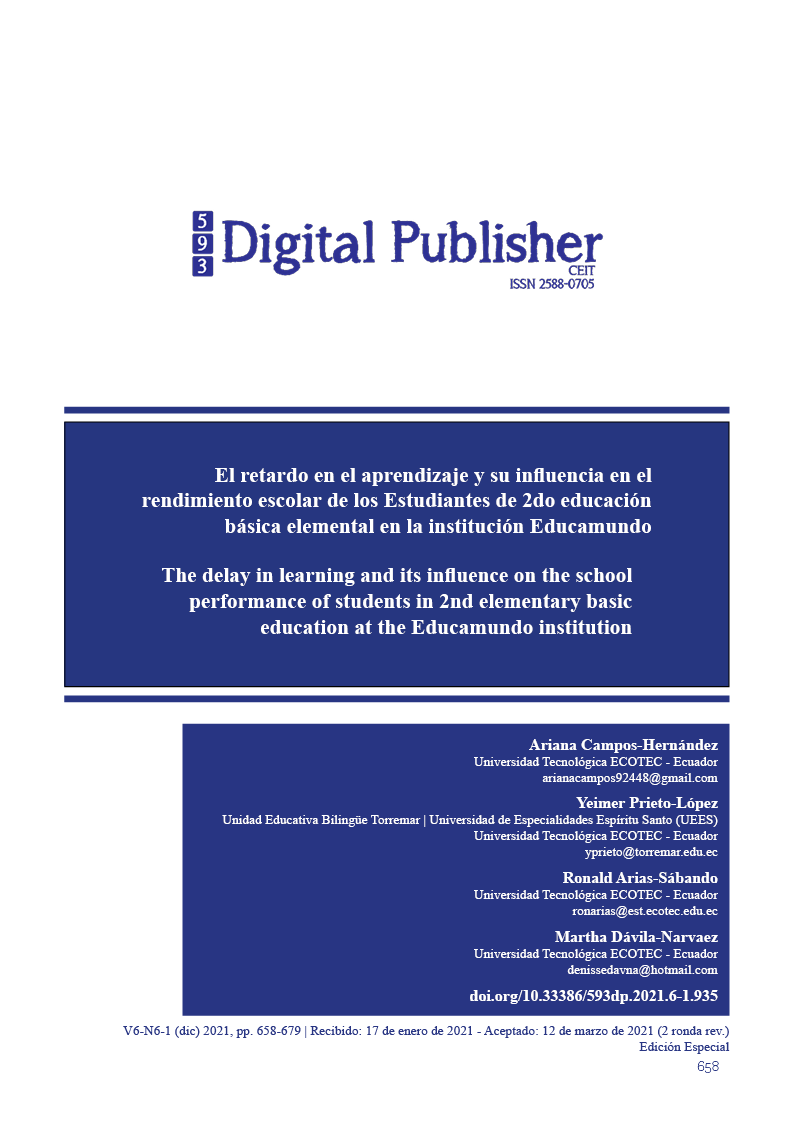The delay in learning and its influence on the school performance of students in 2nd elementary basic education at the Educamundo institution
Main Article Content
Abstract
This research is directed in order to determine the delay in learning, properly speaking, in literacy as a sequel to the pandemic caused by SARS-Covid 19, this study makes it possible to overcome the learning impediments that occur with students, helping them to feel motivated and secure in the process’ development. We are using scientific methods such as: historical-logical, theoretical systematization, scientific observation, surveys and interviews are highlighted in the article. Education must be inclined to develop and promote processes of literacy, to train new generations to achieve critical, purposeful and reflective students who can function and develop meaningful learning; The lack of innovative strategies and materials are causing the student not to be interested in tutorials, the teacher must be adequately trained to achieve satisfactory learning and thus improve teaching; Literacy is the core basis for quality teaching and learning, the teacher must deepen techniques and methods to guide in this process of great importance, the teacher is widely capable of forging students who understand what they read and understand what they write, to achieve students with an excellent level of reading, writing and spelling, we must think about the future of our students, they must achieve their goals and be able to function in a social environment; The development of Literacy is the mechanism to achieve excellent learning in students, so it must seek to apply new and innovative methodologies for the student to learn effectively and efficiently.
Downloads
Article Details

This work is licensed under a Creative Commons Attribution-NonCommercial-ShareAlike 4.0 International License.
1. Derechos de autor
Las obras que se publican en 593 Digital Publisher CEIT están sujetas a los siguientes términos:
1.1. 593 Digital Publisher CEIT, conserva los derechos patrimoniales (copyright) de las obras publicadas, favorece y permite la reutilización de las mismas bajo la licencia Licencia Creative Commons 4.0 de Reconocimiento-NoComercial-CompartirIgual 4.0, por lo cual se pueden copiar, usar, difundir, transmitir y exponer públicamente, siempre que:
1.1.a. Se cite la autoría y fuente original de su publicación (revista, editorial, URL).
1.1.b. No se usen para fines comerciales u onerosos.
1.1.c. Se mencione la existencia y especificaciones de esta licencia de uso.
References
Alves dos Santos Bernardino, R. (2014). A (NÃO) ASSUNÇÃO DA RESPONSABILIDADE ENUNCIATIVA EM ARTIGOS CIENTÍFICOS DE PESQUISADORES INICIANTES E EXPERIENTES. En V Encuentro internacional y VI Nacional de lectura y escritura en educación superior. Bucaramanga, Colombia.
Arboleda, J.C. (2014). LA MACRORRELATORÍA Y LA TRANSVERSALIDAD DE A LECTURA Y LA ESCRITURA. En I Encuentro Nacional Sobre Políticas Institucionales Para el Desarrollo de la Lectura y la Escritura en la Educación Superior. Bogotá, Colombia.
Blanche, B. (1998). Estudios lingüísticos sobre la relación entre oralidad y escritura. Barcelona: Gedisa pp 19-28.
Bruce Tomblin, P. (2010). enciclopedia-infantes.com. Obtenido de https://www.enciclopedia-infantes.com/sites/default/files/textes-experts/es/2468/la-lectoescritura-como-resultado-del-desarrollo-del-lenguaje-y-su-impacto-sobre-el-desarrollo-psicosocial-y-emocional-de-los-ninos.pdf
Cisneros-Estupiñan, M., Olave Arias, G., Rojas García, I. (2013). Alfabetización académica y lectura inferencial. Bogotá, Colombia: ECOE.
Durkheim, m. y. (2005). redalyc.org. Recuperado el 2021, de https://www.redalyc.org/pdf/607/60715110004.pdf
Ekos. (19 de 07 de 2021). www.ekosnegocios.com. Recuperado el 21 de 11 de 2021, de https://www.ekosnegocios.com/articulo/economia-ecuatoriana-se-reduce-5-6-en-primer-trimestre-de-2021
Estévez, D. M. (2015). Valoración de los criterios referentes al rendimiento académico y variables que lo puedan afectar. Revista Médica Electrónica.
Fernández, S. (2017). marcoele.com. Recuperado el 2021, de https://marcoele.com/descargas/24/fernandez-evaluacion_aprendizaje.pdf
Gallego, J. (2016). Metodología y contenido axiológico de los programas de educación en valores. Redylac, 217-226.
Judith Johnston, P. (2010). http://ceril.cl/index.php. Recuperado el 2021, de http://ceril.cl/index.php/articulos?id=410
Lamas, H. A. (2015). Sobre el Rendimiento Académico. Propósitos y representaciones. Vol. 3,, 313-386.
Laura M. Justice, P. (2010). La lectoescritura y su impacto en el desarrollo del niño: Comentarios sobre Tomblin y Sénéchal. Enciclopedia sobre el desarrollo de la primera infancia, 4.
Luzuriaga, L. (1984). Pedagogía. Lozada S.A.
Montealegre, Rosalía; Forero, Luz Adriana. (2006). actacolombianapsicologia.ucatolica.edu.co. Recuperado el 15 de Octubre de 2021, de https://actacolombianapsicologia.ucatolica.edu.co/article/view/410
Piaget. (1984). Lenguaje, Conocimiento y Educación.
Recio, M. y Cabero, J. (2005). Enfoques de aprendizaje, rendimiento académico y satisfacción de los alumnos. Revista de Medios y Educación, 93-115..
Worchel, S. (2004). Psicología social. Ediciones Paraninfo. S.A.
Zubiría, J. (2001). es.slideshare.net. Recuperado el 2021, de https://es.slideshare.net/maryleonflores1/retos-a-la-educacin-del-siglo-xxi-de-zubiria





